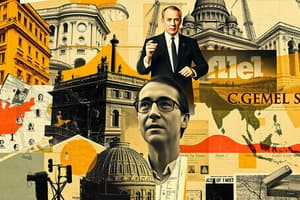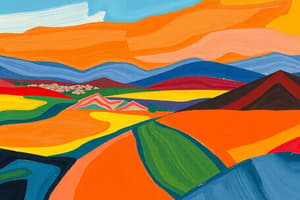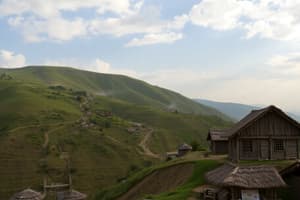Podcast
Questions and Answers
What is latitude?
What is latitude?
The numbering system used to indicate the location of parallels drawn on a globe and measuring distance north and south of the equator.
What is cultural ecology?
What is cultural ecology?
A geographic approach that emphasizes human-environment relationships.
What is longitude?
What is longitude?
The numbering system used to indicate the location of meridians drawn on a globe and measuring distance east and west of the prime meridian (0°).
What does GPS stand for?
What does GPS stand for?
What is GIS?
What is GIS?
What is a base line?
What is a base line?
What is geography?
What is geography?
What is cartography?
What is cartography?
Define culture.
Define culture.
What is a cultural landscape?
What is a cultural landscape?
What is a hearth?
What is a hearth?
Define meridian.
Define meridian.
What is a map?
What is a map?
What is a parallel?
What is a parallel?
What does 'place' refer to in geography?
What does 'place' refer to in geography?
What is projection in cartography?
What is projection in cartography?
Define region.
Define region.
What is scale in geography?
What is scale in geography?
What is space?
What is space?
Define space-time compression.
Define space-time compression.
What is a toponym?
What is a toponym?
What is a township?
What is a township?
Define resource.
Define resource.
What are the 5 Themes of Geography?
What are the 5 Themes of Geography?
What is spatial association?
What is spatial association?
Define globalization.
Define globalization.
What is infrastructure?
What is infrastructure?
What are transition zones?
What are transition zones?
What is a spatial perspective?
What is a spatial perspective?
What does the Census Bureau do?
What does the Census Bureau do?
What is regionalization?
What is regionalization?
What is spatial organization?
What is spatial organization?
What are landscapes?
What are landscapes?
What does 'Why of Where' refer to?
What does 'Why of Where' refer to?
Who was Eratosthenes?
Who was Eratosthenes?
Who was Ptolemy?
Who was Ptolemy?
Who was Idrisi?
Who was Idrisi?
Who is George Perkins Marsh?
Who is George Perkins Marsh?
Who is Carl Sauer?
Who is Carl Sauer?
What is environmental geography?
What is environmental geography?
What are types of distortion in geography?
What are types of distortion in geography?
What is the Mercator projection?
What is the Mercator projection?
What is the Robinson projection?
What is the Robinson projection?
What is the Peters projection?
What is the Peters projection?
What is scale in geography?
What is scale in geography?
What is solar time?
What is solar time?
What are the ways to identify place?
What are the ways to identify place?
What is site?
What is site?
What is situation?
What is situation?
What is a grid/rectilinear pattern?
What is a grid/rectilinear pattern?
What does region refer to in geography?
What does region refer to in geography?
What is periphery in geographical terms?
What is periphery in geographical terms?
What are multi-national corporations?
What are multi-national corporations?
What are physical site characteristics?
What are physical site characteristics?
Flashcards
Latitude
Latitude
Distance north or south of the Equator.
Longitude
Longitude
Distance east or west of the Prime Meridian.
GPS (Global Positioning System)
GPS (Global Positioning System)
System using satellites to determine precise positions on Earth.
GIS (Geographic Information System)
GIS (Geographic Information System)
Signup and view all the flashcards
Cultural Ecology
Cultural Ecology
Signup and view all the flashcards
Cultural Landscape
Cultural Landscape
Signup and view all the flashcards
Hearth
Hearth
Signup and view all the flashcards
Toponym
Toponym
Signup and view all the flashcards
Map
Map
Signup and view all the flashcards
Projection
Projection
Signup and view all the flashcards
Parallel
Parallel
Signup and view all the flashcards
Meridian
Meridian
Signup and view all the flashcards
Place
Place
Signup and view all the flashcards
Region
Region
Signup and view all the flashcards
Spatial Association
Spatial Association
Signup and view all the flashcards
Space-Time Compression
Space-Time Compression
Signup and view all the flashcards
Cultural Geography
Cultural Geography
Signup and view all the flashcards
Environmental Geography
Environmental Geography
Signup and view all the flashcards
Physical Site Characteristics
Physical Site Characteristics
Signup and view all the flashcards
Eratosthenes
Eratosthenes
Signup and view all the flashcards
Ptolemy
Ptolemy
Signup and view all the flashcards
Idrisi
Idrisi
Signup and view all the flashcards
George Perkins Marsh
George Perkins Marsh
Signup and view all the flashcards
Carl Sauer
Carl Sauer
Signup and view all the flashcards
Types of Distortion
Types of Distortion
Signup and view all the flashcards
Mercator Projection
Mercator Projection
Signup and view all the flashcards
Robinson Projection
Robinson Projection
Signup and view all the flashcards
Peters Projection
Peters Projection
Signup and view all the flashcards
Spatial Perspective
Spatial Perspective
Signup and view all the flashcards
Grid/Rectilinear Pattern
Grid/Rectilinear Pattern
Signup and view all the flashcards
Study Notes
Key Terms and Definitions
- Latitude: Indicates the location of parallels on a globe; measures distance north and south of the equator.
- Longitude: Indicates the location of meridians on a globe; measures distance east and west of the prime meridian (0°).
- GPS (Global Positioning System): Determines precise positions on Earth using satellites, tracking stations, and receivers.
- GIS (Geographic Information System): A computer system that manages, analyzes, and displays geographic data.
Concepts in Geography
- Cultural Ecology: Focuses on the relationships between humans and their environment.
- Cultural Landscape: The transformation of natural landscapes by cultural groups, reflecting human activities and societal values.
- Hearth: The origin region of innovative ideas.
- Toponym: A name assigned to a specific portion of Earth's surface.
Mapping and Spatial Analysis
- Map: A two-dimensional representation of Earth’s surface.
- Projection: The method for translating locations from Earth's surface to flat maps.
- Parallel: A circle drawn parallel to the equator, at right angles to meridians.
- Meridian: An arc on a map connecting the North and South poles.
Geographic Relationships
- Place: A specific point on Earth marked by particular characteristics.
- Region: An area defined by a unique combination of features or trends.
- Spatial Association: The relationship between the distribution of one phenomenon and another's distribution.
- Space-Time Compression: The reduction in time it takes to spread ideas or products to distant locations due to improved communication.
Cultural and Physical Geography
- Cultural Geography: Examines how cultural practices shape landscapes.
- Environmental Geography: Studies the interactions of human and physical geography.
- Physical Site Characteristics: Factors like climate, topography, and vegetation that define a location.
Historical Contributions to Geography
- Eratosthenes: Calculated Earth's circumference in the 3rd century BC using shadows at different locations.
- Ptolemy: Created early maps, inaccurately calculated Earth's circumference; his concepts influenced geographic thought for centuries.
- Idrisi: 11th-century Arab geographer who compiled significant geographic data into maps.
- George Perkins Marsh: Emphasized human impacts on the environment in "Man and Nature".
- Carl Sauer: Advocated for the importance of cultural landscapes in geographical studies.
Distortion in Projections
- Types of Distortion: Can involve areas' shapes, distances, sizes, and direction on maps.
- Mercator Projection: Preserves direction but distorts sizes, especially near poles.
- Robinson Projection: Attempts to reduce distortion across all areas, making it suitable for general purposes.
- Peters Projection: Maintains area proportions but distorts shapes, resulting in an atypical presentation of landmasses.
Spatial Organization and Patterns
- Spatial Perspective: Investigates where specific phenomena occur and their relationships across different locations.
- Grid/Rectilinear Pattern: A rectangle-based land survey system forming a grid layout for streets.
- Transition Zones: Areas where characteristics of one region gradually shift to another.
Global and Local Scale
- Scale: Represents the relationship between a studied area and the entirety of Earth, both in size and perspective.
- Multi-national Corporations: Businesses operating in multiple countries, illustrating globalization's impact.
Identifying Place
- Ways to Identify Place: Criteria include place name, site, situation, and absolute location.
- Site: The physical attributes of a location; essential for understanding environmental influences.
- Situation: The relative location of a place concerning others, highlighting interconnectivity.
Additional Concepts
- Resources: Substances that are useful and accessible, shaping economic activities.
- Infrastructure: The essential physical and organizational structures needed for operation within a country or region.
- 5 Themes of Geography: Fundamental concepts include Location, Movement, Place, Human-Environment Interaction, and Region.
Studying That Suits You
Use AI to generate personalized quizzes and flashcards to suit your learning preferences.




